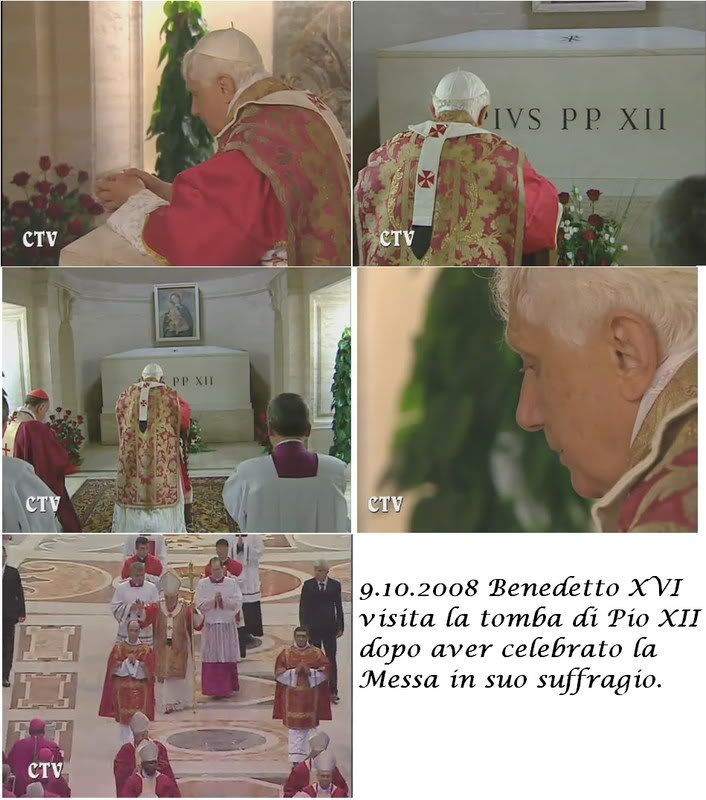 Pope Benedict celebrated a Special Mass for Pope Pius the XII today. Pope Pius the XII went to his master 50 years to this date. There are so many ownderful pictures and this is just a small sampling. Go here to the Ratzinger Forum Pope Benedict Italian photo Section for more. Thank also to the Ratzinger Forum for the quick English translation which can be found here as well as posted below.
Pope Benedict celebrated a Special Mass for Pope Pius the XII today. Pope Pius the XII went to his master 50 years to this date. There are so many ownderful pictures and this is just a small sampling. Go here to the Ratzinger Forum Pope Benedict Italian photo Section for more. Thank also to the Ratzinger Forum for the quick English translation which can be found here as well as posted below.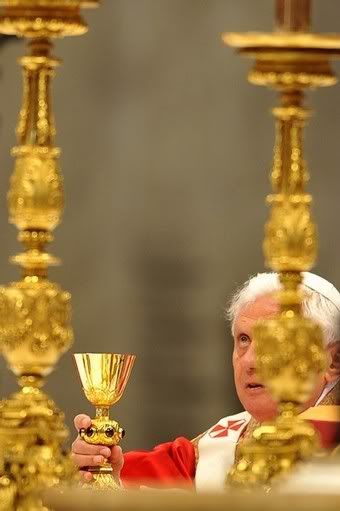 HOMILY AT THE MASS TO MARK THE 50TH DEATH ANNIVERSARY OF POPE PIUS XII, 10/9/08
HOMILY AT THE MASS TO MARK THE 50TH DEATH ANNIVERSARY OF POPE PIUS XII, 10/9/08
Here is a translation of the Holy Father's homily at the Mass today in St. Peter's Basilica.
Eminent Cardinals, venerated Brothers in the Episcopate and Priesthood, dear brothers and sisters:
The passage from the book of Ecclesiastes and the prolog to the First Letter of St. Peter, proclaimed as the first and second readings today, offer us significant points of reflection for this Eucharistic celebration during which we commemorate my venerated predecessor, the Servant of God Pius XII.
Exactly 50 years have passed since his death during the early hours of October 8, 1958. Ecclesiastes, as we heard it, reminds those who intend to follow the Lord that they should prepare themselves for trials, difficulties and sufferings.
In order not to give in to these, it advises, one needs a heart that is upright and constant, one needs faithfulness to God, and patience united with an inflexible determination, to proceed along the path of goodness. Suffering refines the heart of a disciple of the Lord, as gold is purified in the furnace. "Accept what happens to you," writes the sacred author, "and be patient in sorrowful events, because gold is tried in fire as men are tried in the crucible of sorrow" (Eccl ?,4-5).
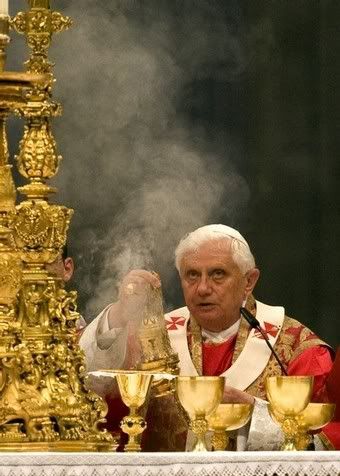 St. Peter, on his part, in the excerpt proposed to us, goes even farther when addressing the Christians of the communities of Asia Minor who were 'afflicted by various trials' - he asks them, notwithstanding, to 'rejoice' (1 Pt 1,6). In fact, trial is necessary, he observes, "so that the genuineness of your faith, more precious than gold that is perishable even though tested by fire, may prove to be for praise, glory, and honor at the revelation of Jesus Christ" (1 Pt 1,7). Then, for the second time, he exhorts them to rejoice, indeed to exult 'with an indescribable and glorious joy' (v. 8).
St. Peter, on his part, in the excerpt proposed to us, goes even farther when addressing the Christians of the communities of Asia Minor who were 'afflicted by various trials' - he asks them, notwithstanding, to 'rejoice' (1 Pt 1,6). In fact, trial is necessary, he observes, "so that the genuineness of your faith, more precious than gold that is perishable even though tested by fire, may prove to be for praise, glory, and honor at the revelation of Jesus Christ" (1 Pt 1,7). Then, for the second time, he exhorts them to rejoice, indeed to exult 'with an indescribable and glorious joy' (v. 8).
The profound reason for this spiritual joy is love for Jesus and the certainty of his invisible presence. It is he who makes the faith and the hope of believers unshakable even in the most complicated and difficult phases of existence.
It is in the light of these Biblical texts that we can read the earthly experience of Papa Pacelli and his long service to the Church begun in 1901 under Leo XIII, and continued under St. Pius X<>
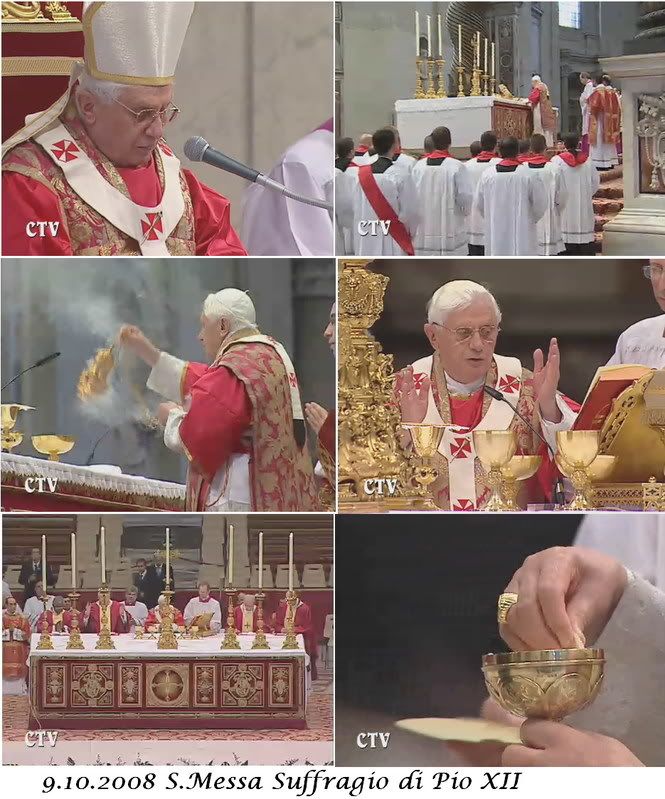 "Miserere mei Deus, secundum magnam misericordiam tuam" - Have mercy on me, Lord, according to your great mercy. With this invocation from Psalm 50(51), Pius XII began his spiritual testament, continuing: "These words, which I am conscious of being undeserving and unequal, were those I said at the moment when, trembling, I accepted my election as the Supreme Pontiff. With greater reason, I repeat them now".
"Miserere mei Deus, secundum magnam misericordiam tuam" - Have mercy on me, Lord, according to your great mercy. With this invocation from Psalm 50(51), Pius XII began his spiritual testament, continuing: "These words, which I am conscious of being undeserving and unequal, were those I said at the moment when, trembling, I accepted my election as the Supreme Pontiff. With greater reason, I repeat them now".
He wrote this two years before his death. To abandon himself in the merciful hands of God: this was the attitude that this venerated precedessor of mine cultivated constantly. He was the last of the Popes who had been born in Rome and came from a family linked for many years to the Holy See.
In Germany, where he was the Apostolic Nuncio, first in Munich then in Berlin till 1929, he left grateful memories behind, above all for having worked with Benedict XV in the attempt to stop the 'useless massacre' of the Great War, and for having grasped since its emergence the danger represented by the monstrous National-Socialistic ideology with its pernicious anti-Semite and anti-Catholic roots.
Made cardinal in December 1929, and soon after Secretary of State, he was a faithful collaborator of Pius XI for nine years, in an era marked by totalitarianisms: Fascist, Nazi and Soviet Communist - condemned respectively in the encyclicals Non abbiamo bisogno , Mit brennender Sorge and Divini Redemptoris
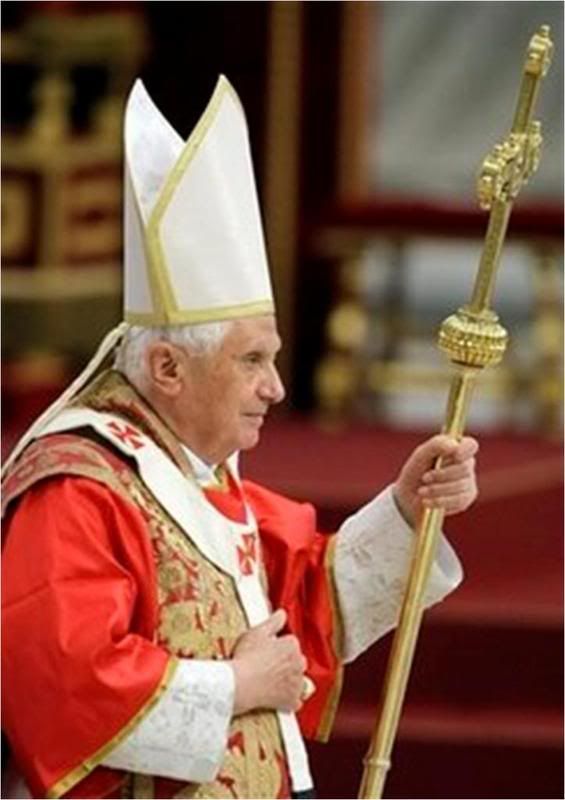 "He who listens to my word and believes... has life eternal" (Jn 5, 24). This assurance by Jesus that we heard in today's Gospel makes us think of the more difficult moments in Pius XII's Pontificate when, taking note of the disappearance of every human certainty, he felt the need, through a constant effort at asceticism, to cling to Christ, the only certainty that never fades.
"He who listens to my word and believes... has life eternal" (Jn 5, 24). This assurance by Jesus that we heard in today's Gospel makes us think of the more difficult moments in Pius XII's Pontificate when, taking note of the disappearance of every human certainty, he felt the need, through a constant effort at asceticism, to cling to Christ, the only certainty that never fades. The Word of God became a light for his path, along which Papa Pacelli had to comfort the homeless and the persecuted, to wipe tears of sorrow and mourn the innumerable victims of the war. Christ alone is the true hope for man - only by trusting in him can the human heart open itslf to the love that conquers hate.
This awareness was ever with Pius XII in his ministry as the Successor of Peter, a ministry that started precisely when the menacing clouds of a new global conflict gathered over Europe and the rest of the world, a conflict that he tried his best in every way to help avoid: 'The danger is imminent, but there is still time. Nothing can be lost with peace. Eveything can be lost with war", he cried out in a radio messagge on August 24, 1939 (AAS, XXXI, 1939, p. 334).
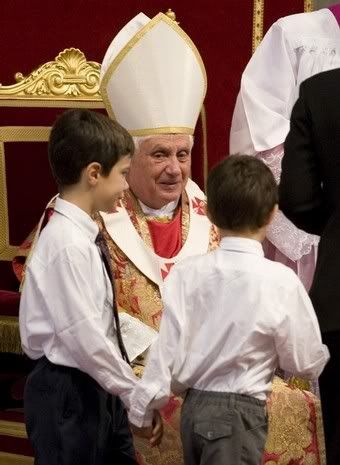 The war placed in evidence the love that he felt for his 'beloved Rome', a love proven by the intense work of charity that he promoted in defense of the persecuted, regardless of religion, race, nationality or political affiliation.
The war placed in evidence the love that he felt for his 'beloved Rome', a love proven by the intense work of charity that he promoted in defense of the persecuted, regardless of religion, race, nationality or political affiliation.
When he was repeatedly advised, after the (German) occupation of Rome, to leave the Vatican for safer ground, his resolute response was always the same: "I will not leave Rome and my duty, even if it means I should die" (cfr Summarium, p.186). His relatives and other witnesses attest to how he voluntarily deprived himself of food, heating, clothing, conveniences, in order to share the condition of people who were sorely tried by the bombings and other consequences of war (cfr A. Tornielli, 'Pio XII, Un uomo sul trono di Pietro').
And how can we forget his Christmas message in December 1942? In a voice torn with emotion, he deplored the situation of "hundreds of thousands of persons who, without any fault of their own, except for reason of nationality or race, are destined to death or progressive wasting away" (AAS, XXXV, 1943, p. 23), with a clear reference to the deportation and extermination being perpetrated against Jews.
He acted secretly and silently precisely because, in the light of concrete situations in that complex historical moment, he sensed that only thus could he avoid the worst, and be able to save as many Jews as possible.
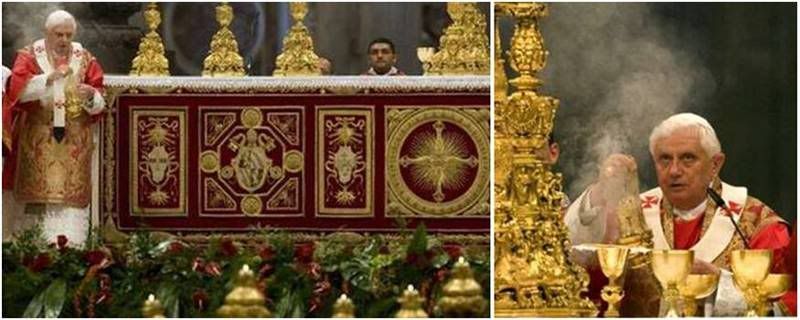 Because of his interventions, numerous and unanimous messages of gratitude were sent to him at the end of the war, and later when he died, from the highest authorities of the Jewish world. For example, the then Foreign Minister of Israel, Golda Meir, wrote: "When the most frightening martyrdom struck our people, during the ten years of the Nazi terror, the voice of the Pontiff was raised in behalf of the victims", and she concluded movingly, "We weep for the loss of a great servant of peace".
Because of his interventions, numerous and unanimous messages of gratitude were sent to him at the end of the war, and later when he died, from the highest authorities of the Jewish world. For example, the then Foreign Minister of Israel, Golda Meir, wrote: "When the most frightening martyrdom struck our people, during the ten years of the Nazi terror, the voice of the Pontiff was raised in behalf of the victims", and she concluded movingly, "We weep for the loss of a great servant of peace".
Unfortunately, the historical debate on the figure of the Servant of God Pius XII, has not always been calm, and has neglected bringing to light all the aspects of his polyhedric Pontificate. He gave so many discourses. allocutions and messages to scientists, doctors, representatives of the most diverse fields of work, some of which still retain an extraordinary relevance today and continue to be a valid refernece point.
Paul VI, who was his faithful co-worker for many years, described him as erudite, an attentive scholar, open to modern ways of research and culture, with ever firm and consistent faithfulness both to the principles of human rationality as well as to the intangible deposit of truth in the faith. He considered him a precursor of the Second Vatican Council (cfr Angelus of March 10, 1974). In this perspective, many of his documents deserve to be recalled, but I will limit myself to citing only a few.
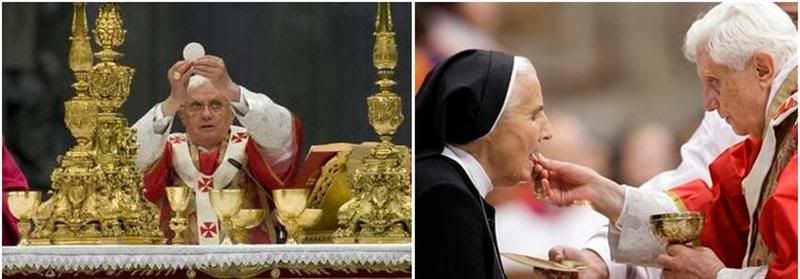 With the encyclical Mystici Corporis, published on June 29, 1943, while war was still raging, he described the spiritual and visible relationships that unite man to the Word incarnate, and proposed, in this context, to integrate the principal themes of ecclesiology, offering for the first time a dogmatic and theological synthesis that would be the basis for the Dogmatic Cosntitution of Vatican-II, Lumen gentium.
With the encyclical Mystici Corporis, published on June 29, 1943, while war was still raging, he described the spiritual and visible relationships that unite man to the Word incarnate, and proposed, in this context, to integrate the principal themes of ecclesiology, offering for the first time a dogmatic and theological synthesis that would be the basis for the Dogmatic Cosntitution of Vatican-II, Lumen gentium.
A few months later, on Sept. 20, 1943, with the encyclical Divino afflante Spiritu, he established the dotrinal norms for the study of Sacred Scripture, highlighting its importance and its role in Christian life. It is a document that shows great openness to scientific research on Biblical texts. How can we not remember this encylical precisely when the Bishops Synod is meeting to consider the topic of "The Word of God in the life and mission of the Church"?
It was Pius XII's prophetic intuition that opened the way for serious study into the characteristics of ancient historiography in order to better understand the nature of sacred books, without weakening them nor denying their historical value. A deeper look into 'literary genres' that mean to understand better what the sacred author meant to say had been looked at with suspicion before then (in the Church), if only because of abuses that had been made.
The encyclical acknowledged their correct application, declaring their legitimacy to be used for the study not only of the Old Testament but also of the New. "Today, this art, which is usually called textual criticism," he explained, "and employed very fruitfully and to great praise by secular authors in their publications, should be rightly applied to Sacred Books, precisely because of the reverence due the Word of God".
He added: "The purpose in fact is to restore with all possible precision the sacred text in its original sense, purging it of the deformations introduced by shortcomings of copyists, and ridding them of glosses and gaps, of the transposition of words, repetitions and similar defects of every kind, which infiltrated the texts as they were manually handed down for centuries." (AAS, XXXV, 1943, p. 336).
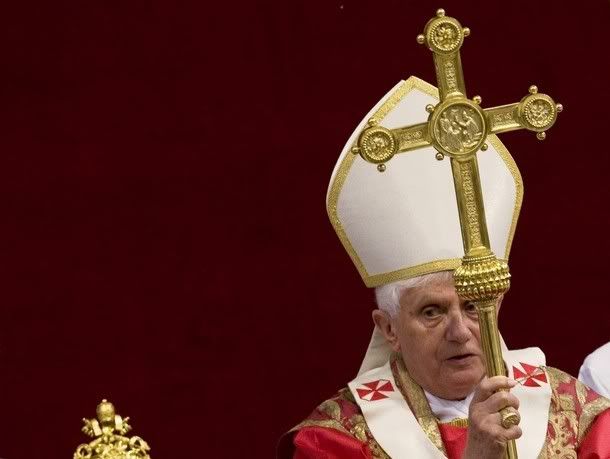
The third encyclical I wish to mention is Mediator Dei, dedicated to liturgy, and published on November 20, 1947. With this document, the Servant of God gave new impulse to the liturgical movement, insisting on 'the essential element of worship' which 'must be internal'. In fact, he wrote, it is necessary "always to live in Christ, dedicate oneself totally to him, so that in him, with him, and through him, we give glory to the Father.
The sacred liturgy requires that these two eklements be intimately joined... Otherwise, religion becomes a formalism without foundation and without content". We cannot fail to point to the noteworthy impulse that this Pontiff gave to the missionary activity of the Church with the encyclicals Evangelii praecones (1951) and Fidei donum(1957), which highlighted the duty of every Christian community to announce the Gospel to the people, as the Second Vatican Council would do with courageous vigor.
Papa Pacelli had shown his love for the missions from the start of his Pontificate when, in October 1939, he personally consecrated 12 bishops from missionary countries, among them an Indian, a Chinese, a Japanese, the first African bishop, and the first bishop of Madagascar. Finally, one of his constant pastoral concerns was the promotion of the role of lay faithful so that the ecclesial community could avail itself of all available energies and resources. For this, too, the Church and the world are grateful to him.
Dear brothers and sisters, as we pray that the cause for the beatification of the Servant of God Pius XII may proceed happily, it is well to remember that sanctity was his ideal, an ideal he never missed proposing to everyone. Because of this, he also encouraged the cause of beatification and canonization for persons belonging to different peoples, representing all walks of life, all roles and professions, and not forgetting women.
Indeed, it was Mary herself, our Lady of Salvation, that he indicated to mankind as the sign of sure hope, proclaiming the dogma of the Assumption in the Holy Year of 1950. In this world today which, like then, is assailed by concerns and anxieties for its future, in this world where, perhaps more than before, the distancing of many from the truth and from virtue raises scenarios devoid of hope, Pius XII invites us to turn ourelves to Mary who was assumed to heavenly glory.
He invites us to invoke her trustingly, so that she may make us appreciate better the value of life on earth and help us look towards the true goal to which we are all destined: that eternal life which, Jesus assures us, he who listens and follows his Word already has.
At the end of the Mass, the Holy Father went down to the Vaticna Grottoes to pray at the tomb of Pius XII.















No comments:
Post a Comment